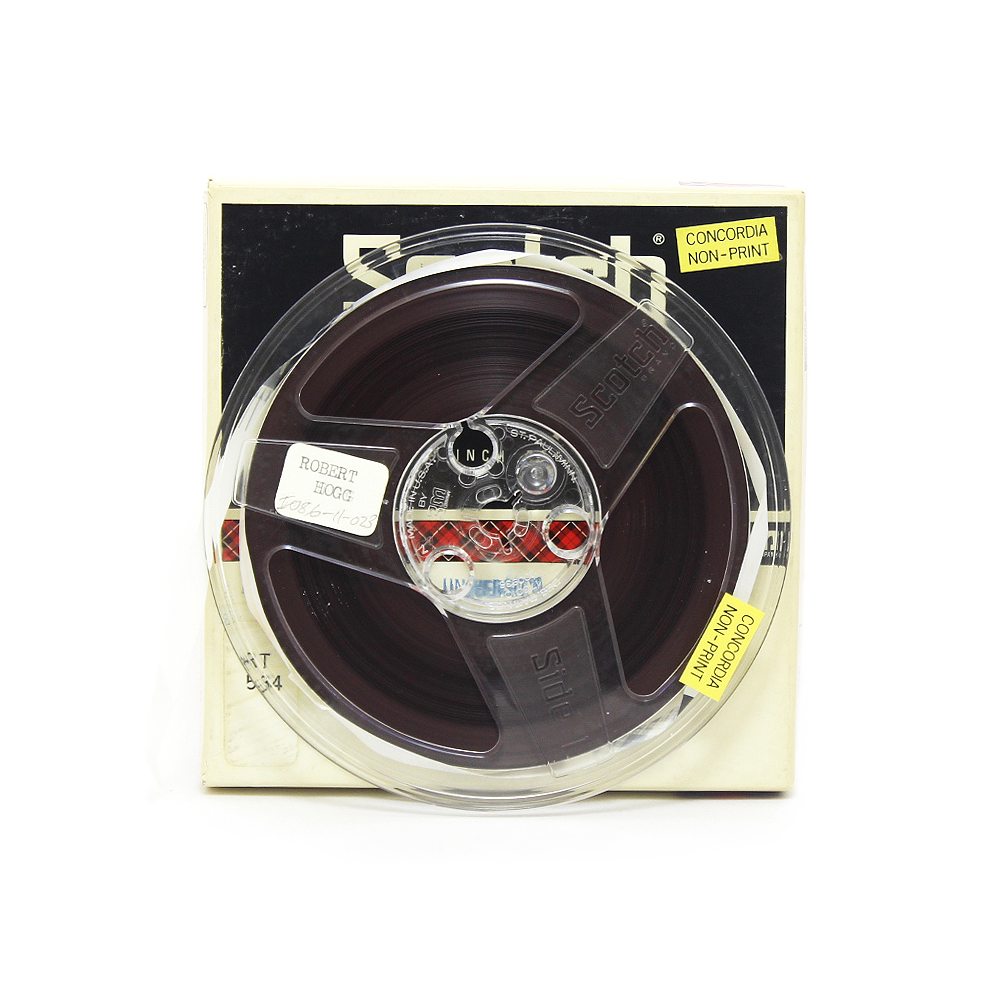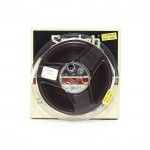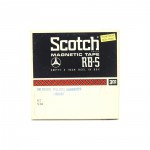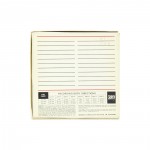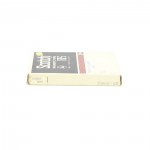Robert Hogg
00:00:00.00
I'd like to open the reading with a poem that's really part of a verse-play that I wrote in 1963 or 64, a long time ago, a play that never really made it as a play, but fragments of which I've salvaged because I like, I like what they do. And so this is sort of called "Fragments of an Imaginary Noh Play," and this is the dream that one of the figures has.
Annotation
00:00:26.93
Reads "Fragments of an Imaginary Noh Play - Walkie's Dream" [INDEX: morning, wake, sleep, dream, water, sun, east, sea, swim, day, glass, window]
Robert Hogg
00:02:39.35
I'd like to read a few selections from my book of poems The Connexions, which was printed in 1965. I'd like to begin with a poem entitled "The Command." I should just briefly mention that these poems were all written in a very short period of time between November and January, mostly, and a few poems written later on throughout that spring of 1965. That is, November 1964 through the early part of 1965. Most of them were written in New York and involved an experience I had there where I was very ill, and part of the time delirious. This poem was actually written a little later than some of the poems that follow. They're not spaced out chronologically in the book. "The Command."
Annotation
00:03:34.66
Reads "The Command" [INDEX: snow, winter, unsaid, city, ice, wind, young, death, Erie, Great Lakes, place, New York, body, water, disease, sun, land, earth, memory, remembrance, mind, season, Eden, journey, snake]
Robert Hogg
00:06:20.76
This poem, written, actually, previous to the other, is entitled "Eclipse," and it was written without my own, without my knowledge, actually, at the time, that there was an eclipse taking place. It was on the eighteenth of December, 1964, written in New York City. This was a lunar eclipse. Isn't there a lunar eclipse about to....is that tonight? [Laughter] It's a full moon tonight. Something's happening.
Annotation
00:07:06.12
Reads "Eclipse" [INDEX: earth, moon, fire, oracle, snake, body, naked, queen, sex, sperm, woman]
Robert Hogg
00:09:12.14
The she of that last stanza enters into this poem, which was originally entitled "The Changing of Skin." There's a good, considerable amount of snake imagery in these poems, all of which was the result of having hepatitis and the turning of colours. I had hepatitis rather badly, and relapsed twice with it, and each time I relapsed, of course, I turned bright yellow again. And it was quite an unusual experience, especially the first time, in which I was in the hospital, and the nurses, especially the young nurses, would come round and look at you with the most peculiar eyes, you know, as if you were really something from another world, having changed colour like that.
Annotation
00:10:02.48
Reads ["So it is empty, but for the animals"] [INDEX: New Testament, Judaism, Jew, Moses, Jesus, crucifixion, Mary Magdalene, vision, name, night, disease, illness, violence, snake, child, sex, mythology]
Robert Hogg
00:14:08.99
Another poem connected with this quite closely, another dream poem, entitled "The Cave."
Annotation
00:14:17.33
Reads "The Cave" [INDEX: child, cave, winter, day]
Robert Hogg
00:15:36.44
After this there's a descent, a further descent down, as has been instructed in an earlier poem, called "The Command," and then a coming-out again. And then a poem that remembers, really, it's quite different, I'm not sure how much this poem really belonged in The Connexions. Most of the poems definitely did belong in the book, I think, though some of them don't bear reading, I don't think, now. This poem bears reading, I think, but doesn't really belong in the book. How's that? [Laughs.]
Annotation
00:16:09.67
Reads ["This much is remembered"] [INDEX: memory, remembrance, sea, man, land]
Robert Hogg
00:16:55.91
And another poem, which was originally titled, "Poem to Out of This World and Soul Lies," was really written with John Sinclair in mind, whom I hope all of you keep in mind at times, specially now that he's in prison, in Michigan. It was written to...not written really for him, but written with him in mind, listening to the record "Out of This World and Soul Lies" by John Coltrane.
Annotation
00:17:23.49
Reads "Out of This World" [INDEX: beginning, origin, eternity, birth, egg, snake, woman, sex]
Robert Hogg
00:19:09.62
And the last poem in the collection is entitled, simply, "Song."
Annotation
00:19:16.37
Reads "Song" [INDEX: sun, wind, tree, nature, bird, air, voice]
Robert Hogg
00:19:34.49
[A bell chimes] Have to change my trunks....Now I'd like to read a few poems that were written not too far removed from the time of The Connexions, some of them, and then moving right on up to the present. This poem titled simply, "Once," and the "once" is really part of the poem.
Annotation
00:20:01.27
Reads "Once" [INDEX: poem, poet, poetry, love, line]
Robert Hogg
00:20:24.82
And another little poem called "Tropos," which means, "to turn," in Greek, or "turning," in Greek.
Annotation
00:20:34.82
Reads "Tropos" [INDEX: turning, couple, sight, beauty]
Robert Hogg
00:20:50.23
Another short poem, written some time later, but in the same vein. "A Fragment of Love."
Annotation
00:20:57.41
Reads "A Fragment of Love" [INDEX: winter, seasons, woman, nature]
Robert Hogg
00:21:12.86
This poem was written about four or five years ago also, and was written after having given a tarot reading for a friend. And I take it that most of you will have some familiarity with the tarot cards, and anyway, the poem attempts in several places to explain, in other places just simply to give you the reading of the tarot as it was done out. And so I've just simply in parts just listed the cards that fell. It's simply called "A Reading."
Annotation
00:21:48.02
Reads "A Reading" [INDEX: tarot, reading, fate, lover, magician, mother, father, night, child, blood, French, woman, friend, death, moon, sea, justice, sun, bilingual]
Robert Hogg
00:24:03.88
And now, a longer poem, a poem that really, in a sense, deals with the subject of poetry, and the subject of love, together. The poem is entitled "Aries and Pisces' Dream." And really, I supposed, ought to be dedicated to Charles Olson.
Annotation
00:24:30.43
Reads "Aries and Pisces Dream" [INDEX: night, woman, awake, love, space, Charles Olson, moon, sun, earth, real, distance, bird, sleep, dance, word, world, measure, death]
Robert Hogg
00:29:03.65
A short, and rather lyrical poem, which was written in response to a letter, not in very good response to a letter, actually...in which the other person asked me if I wouldn't tell them about Psyche, what I've defined psyche, which I found was an absolutely impossible thing to do, and something that I hope I can--you could--you know, once you spend one's whole life, I suppose, trying to do it, God help you if you actually get it done, you know. There'd be nothing left to do. This poem is called "Of Psyche."
Annotation
00:29:39.11
Reads "Of Psyche" [INDEX: love, spring, Psyche, woman, man, beauty, window, morning, dance]
Robert Hogg
00:30:26.01
A recent poem, entitled "To the Moon." The moon gets into a lot of my poems, one way or another. This one woke us up the other night, rather nastily.
Annotation
00:30:37.06
Reads "To the Moon" [INDEX: moon, face, pain, woman, mother, light, night, laugh]
Robert Hogg
00:31:12.99
This is an untitled poem, a happy poem, I hope, written in September, on the seventh of September, and it struck me, as it was the seventh of September, that in fact, in the Latin, that September is the seventh month, and was apparently the seventh month of the Roman calendar year. And so I was suddenly taken by that, because, you know, if you write dates very often, you probably use the typical numerical method of you know, putting, the day, and the month, and the year, in terms of numbers. And you usually think of September as the ninth month, which in fact it is, in our calendar, but the word is obviously, suggests, as October suggests the eighth month, September is the seventh. And so I was happy. It seemed like something new was happening. It was nice, because you know, in September, in northern, any part of Ottawa, Ottawa-area, or Ontario, or Quebec, you know what's coming, eh? You know, it's still here. So you got to be happy while you can. And it was also, I should add, that even in old times, you know, the calendar year was divided into twelve months, and so the seventh month would, in a sense, be the beginning of a new cycle. It would be six months, and that would end the first half, and there would be six more months, and September would be the first of it again. And that also excited me. It felt like Spring. [Laughter] But I'm crazy.
Annotation
00:32:42.07
Reads Untitled ["Fresh September"] [INDEX: nature, seasons, winter, spring, bird, sun, September]
Robert Hogg
00:33:05.83
And now a sad poem, for someone who has, who had cancer, and is apparently alright, which is kind of nice. I think I was pessimistic, I'm always terribly pessimistic about something like that, I don't find it easy to be optimistic in such situations, and optimism, the optimism that I now have again for this person is only as qualified, I dare say. The poem is entitled "A Lifetime," and the more I thought about that word--I didn't get the title easily, I had to work it out--and the more I thought about that word, the more it began to mean to me. I think if you really think about that word, lifetime, as one word, it's very peculiar. And then I thought, I was thinking about time-life. And that really, that was really funny. It's strange, isn't it, that those, that that corporation should own those two words, as they do. It's very difficult to use them. We can't just call it--like, can you imagine putting out a magazine called Life? You know. Or Poetry magazine. These are very good names for a magazine. Or Time, you know. That's pretty big stuff! [Laughter] What could they--and look what they've done with it, you know. So reduction is still possible. "A Lifetime." ...And one other thing [Laughter] before I begin this one, it's not altogether this way, you've probably, you know, you've probably found that my lines, my poetry, has a tendency, especially in the earlier poems, to be, like they say, poetic, you know, to try to be a little, to try to sound pretty. It was something that meant a great deal to me earlier, and means a little less to me now than it did then, though beauty still means as much to me as ever. I have tried, I have looked for in my poetry--and one thing, it was very pleasant hearing Ron's poems tonight, is a quality of voice, a quality of language, that doesn't necessarily try to be pretty at all--that tries to use the language that we are actually living with. I don't mean to try to talk about the old problems of prose and poetry, or anything of the kind. But just that, language needn't necessarily be quote, poetic, unquote. We had kind of a talk about that last night, at the reading in Ottawa, it was pretty funny. And this poem, just at least its beginning, it has that colloquialism that I enjoy.
Annotation
00:35:37.03
Reads "A Lifetime" [INDEX: idea, giving, time, rain, cancer, nothing, disease, death, dying, rose, tulip, growth, dark, waiting, silence]
Robert Hogg
00:37:03.65
And the last poem that I'd like to read is a poem that is really a freak poem. This poem has taken me at least two years to write, a little longer than two years to write, I think, and has been written over and over and over and over again, and like I said about time/life, this one has also suffered a phenomenal reduction, starting out as about six pages and ending up as three, which is usually a good sign. Originally there was a line in the poem, something about the presages of civilization, you know, are on my back or in my ear, or something like that, and it was a horrible line. Like a lot of the other lines it had to be excised, and rewritten, and so forth. But the thought of it, the thought of that word, the meaning of that word, contained, lived with me, and lived with my sense of the poem. And so I've entitled it simply, "Presages." And also, to make it a little more comprehensible, I've put a sort of bracket, sub-title, "From a Sixth-Floor Apartment." Actually, the poem was begun in Manhattan, not in Manhattan I'm sorry, in Queens, New York, when I was staying at my in-laws' house a little over two years ago, just briefly, and was written from their sixth-floor apartment. It actually, the strange thing about this poem is it was mostly written since then, really re-written, although the first part is pretty much as it was originally.
Annotation
00:38:24.43
Reads "Presages: From a Sixth-Floor Apartment" [INDEX: city, New York, distance, apartment, earth, death, air, body, dream, river, sea, mind, time, soul, property, civilization, blood, fire, fish, Psyche, beach]
Robert Hogg
00:40:40.10
Thank you.
Annotation
00:40:42.66
END OF RECORDING.
